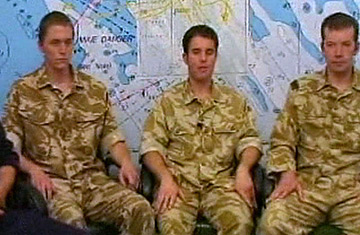
A video grab from Iranian television shows members of the group of 15 detained British sailors and marines whom Iran claims entered Iranian water illegally.
Iran has backed off the suggestion by some hard-line officials that the sailors and marines might be tried for entering Iranian waters. The country's national security chief Ali Larijani told a British TV network on Monday night that the question of whether the Britons had been in Iranian waters should be adjudicated on the basis of bilateral discussions, and that if they had indeed transgressed, an apology would get them released; thus far Britain has insisted its personnel were in Iraqi waters, while Iran insists they had entered its sovereign territory. Pursuing this line may allow the issue to be resolved simply by casting it as a misunderstanding — after all, even the CIA World Factbook notes that "Iraq's lack of a maritime boundary with Iran prompts jurisdiction disputes beyond the mouth of the Shatt al Arab in the Persian Gulf."
But there are other factors at work. The news that an Iranian diplomat held in Iraq since February 4 in circumstances that are unclear has been released — and the fact that Iraq's foreign ministry is "intensively" lobbying the U.S. to release five Iranians held incommunicado since their detention by U.S. forces on January 11 — may have significant bearing on the outcome of the Iran-Britain standoff. An Iranian foreign ministry spokesman said the release of the five Iranian captives "will be a factor that will help in the release of the British sailors and marines."
Britain's diplomatic efforts have been premised on separating the issue of the sailors from all other points of conflict with Iran, such as the standoff over its fledgling nuclear program or the Iranian detainees in Iraq. But Prime Minister Tony Blair appears to have been caught between conflicting impulses. On the one hand, he has at times assumed a tough posture edging toward ultimatums, in line with British public sentiment that has been antagonized by the spectacle of sailors and marines in humiliating confessional appearances on Iranian TV. It is also in keeping with the harsher language emanating from Washington, where President Bush last weekend referred to the British captives as "hostages" and described their capture as "inexcusable." But Blair knows that such language, and even his government's move to take the matter before the U.N. Security Council last week, isn't likely to help finesse a diplomatic solution. And in the absence of palatable alternatives, a diplomatic solution — in spite of President Bush's tough language and insistence that no concessions be made — is his only option.
The difficulty, of course, is that both the U.S. and Iran appear to see the standoff over the British personnel as just another front in their strategic contest. Britain's Independent may have shed new light on the Iranian action Monday by reporting that the intended targets of the January 11 U.S. raid that seized the Iranians in the Iraqi city of Erbil had actually been two high-ranking Iranian generals. The paper suggests the Iranian leadership has been incensed by the U.S. campaign of snatching Iranian officials in Iraq, and sought to capture the Britons in retaliation, or at least to use their capture to send a warning and gain leverage.
Despite positive indications in recent days, it's too early to be confident of a speedy release for the captured personnel. The U.S. may be reluctant to cooperate by acceding to the Iraqi government's demand that it free the Iranians it is holding. And the power struggle under way in Tehran between hard-liners and more pragmatic elements over managing the nuclear standoff with the West has reportedly seen some sharp-elbowed infighting over whether to use the captive Britons to bargain for the release of Iranians held by the U.S.
There's every reason to believe that the 15 Brits being held in Tehran will, ultimately, be sent home. But the outcome of the standoff is not yet the exclusive responsibility of the diplomats who can achieve compromises, and that could prolong the crisis.
